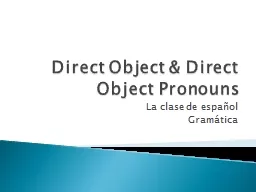PPT-Indirect Object Pronouns
Author : crashwillow | Published Date : 2020-08-03
aka the IOPs Cap2 Gram 1 Pg 50 What are Indirect Objects and IOPs Indirect Objects tell to whom or for whom the action of the verb is performed The preposition
Presentation Embed Code
Download Presentation
Download Presentation The PPT/PDF document "Indirect Object Pronouns" is the property of its rightful owner. Permission is granted to download and print the materials on this website for personal, non-commercial use only, and to display it on your personal computer provided you do not modify the materials and that you retain all copyright notices contained in the materials. By downloading content from our website, you accept the terms of this agreement.
Indirect Object Pronouns: Transcript
Download Rules Of Document
"Indirect Object Pronouns"The content belongs to its owner. You may download and print it for personal use, without modification, and keep all copyright notices. By downloading, you agree to these terms.
Related Documents














